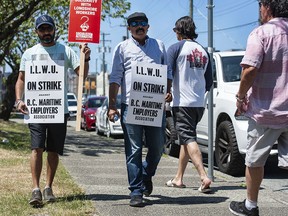Braid: B.C. port worker strike is a looming economic disaster for Alberta and Canada
When a crisis begins in the West, Ottawa often gets the message at wagon-train speed

Article content
Ottawa was caught “flat-footed” by the B.C. port workers’ strike, says Alberta Transportation Minister Devin Dreeshen.
“About $500 million worth of cargo every day flows through West Coast ports for Alberta, whether that’s perishable food coming in to the province or exports leaving the province,” Dreeshen said in an interview.
“It’s a very serious situation.”
There will be economic damage to agriculture, retail, manufacturing, consumers, the railways, the shippers themselves. You name it, the effects of a prolonged strike would be widespread and dire.
But Ottawa didn’t have a handle on a crisis that led to a work stoppage now into its fifth day, halting all shipments in and out of 30 coastal ports.
They include Vancouver and Prince Rupert, the ports ranked first and third in shipping volume for the whole country.
By sharp contrast, the federal government had back-to-work legislation ready for passage the day dock workers in Montreal went on strike in 2021. When a crisis begins in the West, Ottawa often gets the message at wagon-train speed.
“There should have been proactive measures,” Dreeshen says. “This should have been on everyone’s radar. Proactiveness could have prevented a lot of economic hurt we’re feeling.”
The feds are alert now. Labour Minister Seamus O’Regan is in Vancouver. As an MP for St. John’s, he surely knows a few things about shipping. Federal mediators are involved in talks with the B.C. Maritime Employers Association and International Longshore and Warehouse Union.
But the strike is already entrenched. Talks broke down on the weekend. We may be looking at back-to-work legislation, nobody’s favourite solution. That could take days or even weeks to organize because Parliament isn’t in session.
“We’re feeling the effects right now,” Dreeshen says. “There are trains parked on the prairies even as we speak.
“They know there’s no point going toward Vancouver. The cascading, domino effects of trains and crews essentially stops our exports right now.
“We’re not in harvest where there’s a huge demand of grain exports needing to go, but there are still grain exports going to the West Coast right now. And there’s obviously other products that need timely delivery.
“Penalties will be coming later that will transcend backward throughout the supply chain. So, yeah, it’s just going to get materially worse as time goes on.”

One major penalty is demurrage for delay time in releasing containers. The charges hit the parties involved but soon back up to consumers.
This strike could actually raise the inflation rate, which was still rising in Alberta as late as May due in large part to higher transportation costs. Obviously, this is the worst possible time for a transportation crisis.
“There’s already a significant amount of trade that is really just grinding to a halt,” according to Dreeshen. “And, obviously, if it was resolved today, it would take some time to get things back up and running.”
“We’ve already met with shippers and users of the port from agriculture, forestry, mining, manufacturing sectors, railways and trucking companies that ship products in and out of West Coast ports.”
The message is universal. This is big economic trouble for Alberta and the country.
“That’s why we think it’s very prudent right now for the federal government to reconvene and use legislation, if necessary.”
When the Trans Mountain pipeline extension eventually opens, it, too, could be vulnerable to work stoppages. Imagine that — spending nearly $30 billion on a project that could be paralyzed.
Dreeshen and Matt Jones, the Jobs minister, sent a letter to O’Regan late Tuesday afternoon, calling for Ottawa to immediately recall parliament and consider legislation.
The ministers point out that Alberta’s daily shipments through Vancouver and Prince Rupert comprise 16 per cent of Canada’s total traded goods.
This is a legal strike between private parties. If a settlement can come very quickly, fine. Otherwise, Ottawa needs to stop it cold.
Don Braid’s column appears regularly in the Herald.
Twitter: @DonBraid






Postmedia is committed to maintaining a lively but civil forum for discussion. Please keep comments relevant and respectful. Comments may take up to an hour to appear on the site. You will receive an email if there is a reply to your comment, an update to a thread you follow or if a user you follow comments. Visit our Community Guidelines for more information.